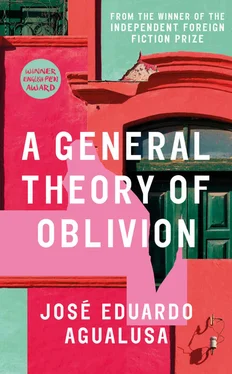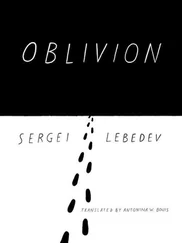She thought about the bottle of Coca-Cola. About the bottles of water she kept in the pantry. She would need to drag herself fifteen metres or so. She stretched out her arms, braced her hands against the cement, straightened her trunk. It was as if her leg were being chopped off with the blade of an axe. She yelped. Her own yelp surprised her.
‘I’ve woken the whole building,’ she muttered.
She woke up Little Chief, in the next-door apartment. The businessman had been dreaming about the Kianda. He had been having the same dream for several nights. He would go out onto the veranda in the middle of the night and see a light gleaming in the lagoon. The light increased in volume, a rainbow that was round and musical, and in the meantime the businessman felt his body losing its weight. He awoke at the moment when the light rose to meet him. This time he woke earlier, because the light screamed, or it seemed to him as though the light was screaming, in a sudden explosion of mud and frogs. He sat up in bed, feeling stifled, his heart pounding. He remembered the time he had spent shut away in that same room. Sometimes he used to hear a dog barking. He’d hear the distant voice of a woman chanting old songs.
‘The building is haunted,’ Papy Bolingô had assured him. ‘There’s the barking dog, which no one’s ever seen, like a kind of phantom dog. They say it can go through walls. You’ve got to be careful when you’re asleep. The dog comes through the wall, it’s barking, bow-wow-wow , but you don’t see a thing, you just hear its barking, and then it inveigles itself into your dreams. You start having dreams that are really filled with barking. One of the residents, on the floor below, a young craftsman called Eustákio, woke up one morning and could no longer speak. He just barked. They took him to a traditional doctor, pretty well renowned, who took five days to remove the dog’s spirit, and its barking, from Eustákio’s head.’
Little Chief found the building’s architecture peculiar. He was confused by the wall blocking off the corridor, an arrangement that didn’t occur on the other floors. There had to be another apartment on that floor — but where was it?
Meanwhile, just a few metres away, on the other side of the wall, Ludo forced herself to move towards the kitchen. With each centimetre she felt further away from her own self. The first light of morning found her still in the living room, about two metres from the door. She was burning with fever. Her thirst was troubling her more than the pain. Around two in the afternoon she reached the door. She fainted. She opened her eyes and saw, vaguely, a face before her. She brought her hands to her eyes, rubbed them. The face was still there. A boy, it looked to her like the face of a boy, with two big astonished eyes.
‘Who are you?’
‘My name’s Sabalu.’
‘Did you get in from the scaffolding?’
‘Yes, I climbed the scaffolding. They put scaffolding on the building next door. They’re painting it. The scaffolding comes nearly all the way up to your terrace. Then I piled some crates on the top level and climbed up. It was easy. What about you, did you fall?’
‘How old are you?’
‘Seven. Are you dying?’
‘I don’t know. I did start thinking I was dead already. Water. Go get me water.’
‘Do you have money?’
‘Yes, I’ll give you all the money but go get me water.’
The boy got up. He glanced around him.
‘There’s hardly anything here. Not even furniture. Looks like you’re poorer than me. Where’ve you got the money?’
‘Water!’
‘OK there, grandma, take it easy, I’ll go fetch you a soda.’
He brought the bottle of Coca-Cola from the kitchen. Ludo drank straight from the bottle, greedily. She was struck by how sweet it was. It had been years since she’d felt the taste of sugar. She told the boy to go to the study to find her purse, where she kept the money. Sabalu came back, laughing hard as he scattered wads of banknotes around him.
‘This isn’t money any more, grandma, it’s not worth anything.’
‘There’s silver cutlery. Take the silver cutlery.’
The boy laughed again.
‘I’ve already taken them, didn’t you even notice?’
‘No. Was it you who brought the bread yesterday?’
‘The day before. You don’t want to call a doctor?’
‘No, no, I don’t!’
‘I can call a neighbour. You must have neighbours.’
‘No, no! Don’t call anyone.’
‘You don’t like people? I don’t like people either.’
Ludo started to cry.
‘Go away. Go away.’
Sabalu got up.
‘Where’s the door to get out?’
‘There isn’t one. Leave the way you came.’
Sabalu put the rucksack on his back and disappeared. Ludo took a deep breath. She leaned on the wall. The pain was subsiding. Maybe she should have let the boy call a doctor. Then she thought that along with the doctor would come the police, then journalists, and she was keeping a skeleton on the terrace. She preferred to die here, a prisoner and yet free, just as she had lived the past thirty years.
Free?
Often, as she looked out over the crowds that clashed violently against the sides of the building, that vast uproar of car horns and whistles, cries and entreaties and curses, she experienced a profound terror, a feeling of siege and threat. Whenever she wanted to go out she would look for a book in the library. She felt, as she went on burning those books, after having burned all the furniture, the doors, the wooden floor tiles, that she was losing her freedom. It was as though she was incinerating the whole planet. When she burned Jorge Amado she stopped being able to visit Ilhéus and São Salvador. Burning Ulysses , by Joyce, she had lost Dublin. Getting rid of Three Trapped Tigers , she incinerated old Havana. There were fewer than a hundred books left. She kept them more out of stubbornness than to make any use of them. Her eyesight was so bad that even with an enormous magnifying glass, even holding the book in direct sunlight, sweating as though she were in a sauna, it took her an entire afternoon to decipher one page. In recent months, she had taken to writing her favourite lines from the books she had left in huge letters on those walls of the apartment that were still blank. It won’t be long, she thought, and I really will be a prisoner. I don’t want to live in a prison. She fell asleep. She was awoken by a quiet laugh. The boy was there again in front of her, a slender silhouette, cut out against the stormy glare of the sunset.
‘Now what? You’ve already taken the cutlery. I don’t have anything else.’
Sabalu laughed again.
‘Tsh, grandma! I thought you’d died.’
He put his rucksack down at the lady’s feet.
‘I bought medicines. Loads of them. They’ll help you.’ He sat down on the floor. ‘I also bought more Coke. And food, grilled chicken. You hungry?’
They ate just there, where they were, sharing the bread and the pieces of chicken. Sabalu showed her the medicines he had brought: painkillers, anti-inflammatories.
‘I went to Roque Santeiro. I talked to this guy. I said my father had hit my mother, he broke her arm, and she’s embarrassed to go to the doctor. Then he sold me all this. I paid with the money from the cutlery. There was loads left over. Can I sleep in your house?’
Sabalu helped the old lady up, took her to her room and lay her down on the mattress. Then he lay beside her and fell asleep. The next morning he went to the market and came back carrying vegetables, matches, salt, various spices and two kilos of beef. He also brought a portable stove, the kind for camping, with a small butane gas canister. He did the cooking himself, on the bedroom floor, following Ludo’s instructions. They both ate with gusto. Then the boy did the washing-up and put away the crockery. He roamed about the house, curious:
Читать дальше












